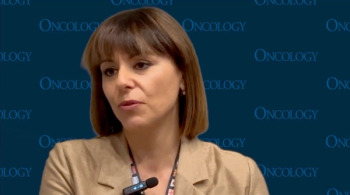
FDA Approves Oral Combo of Decitabine and Cedazuridine for Myelodysplastic Syndromes
The FDA has approved an oral combination of decitabine and cedazuridine for adult patients with myelodysplastic syndromes.
The FDA has approved an oral combination of decitabine and cedazuridine (Inqovi) for adult patients with myelodysplastic syndromes (MDS).1
The indication includes those with previously treated and untreated, de novo, and secondary MDS with the following French-American-British subtypes: refractory anemia, refractory anemia with ringed sideroblasts, refractory anemia with excess blasts, and chronic myelomonocytic leukemia (CMML), as well as intermediate-1, intermediate-2, and high-risk International Prognostic Scoring System groups.
The FDA recommended dose of Inqovi is 1 tablet (35 mg decitabine and 100 mg cedazuridine) taken orally on an empty stomach once daily on days 1 through 5 of each 28‑day cycle.
“The FDA remains committed to providing additional treatments to patients during the coronavirus pandemic. In this case, the FDA is making available an oral outpatient treatment option that can reduce the need for frequent visits to health care facilities,” Richard Pazdur, MD, director of the FDA’s Oncology Center of Excellence and acting director of the Office of Oncologic Diseases in the FDA’s Center for Drug Evaluation and Research, said in a press release.2 “At this critical time, we continue to focus on providing options to patients with cancer, including regimens that can be taken at home.”
The efficacy and safety of Inqovi was investigated in 2 open-label, randomized, crossover trials. The ASTX727-01-B trial (NCT02103478) included 80 adult patients with MDS (International Prognostic Scoring System [IPSS] Intermediate-1, Intermediate-2, or high-risk) or CMML, while the ASTX727-02 trial (NCT03306264) included 133 adult patients with MDS or CMML, including all French-American-British classification criteria and IPSS Intermediate-1, Intermediate-2, or high-risk prognostic scores.
In both trials, patients were randomized in a 1:1 fashion to receive either Inqovi (35 mg decitabine and 100 mg cedazuridine) orally in cycle 1 and 20 mg/m2 of decitabine intravenously (IV) in cycle 2 or the reverse sequence. Both Inqovi and IV decitabine were administered once daily on days 1 through 5 of a 28-day cycle.
Starting with cycle 3, all patients received Inqovi orally once daily on days 1 through 5 of each 28-day cycle until disease progression or unacceptable toxicity. Both trials provided comparison of exposure and safety in the first 2 cycles between oral Inqovi and IV decitabine and description of disease response with Inqovi.
Importantly, comparison of disease response between the 2 arms was not possible because all patients received Inqovi starting from cycle 3.
Trial ASTX727-01-B demonstrated a complete response (CR) rate of 18% (95% CI, 10-28) and median duration of CR was 8.7 months (range, 1.1-18.2). Of the 41 patients who were dependent on red blood cell (RBC) and/or platelet transfusions at baseline, 20 (49%) became independent of RBC and platelet transfusions during any consecutive 56-day post-baseline period. Moreover, of the 39 patients who were independent of both RBC and platelet transfusions at baseline, 25 (64%) continued to be transfusion-independent during any consecutive 56-day post-baseline period.
Comparatively, ASTX727-02 demonstrated a geometric mean ratio of the 5-day cumulative decitabine area under the curve (AUC) after 5 consecutive once daily doses of Inqovi compared to that of IV decitabine was 99% (90% CI, 93-106). Efficacy results showed that 21% of patients achieved CR (95% CI, 15-29) and median duration of CR was 7.5 months (range, 1.6-17.5).
Further, of the 57 patients who were dependent on RBC and/or platelet transfusions at baseline, 30 (53%) became independent of RBC and platelet transfusions during any 56-day post-baseline period. Of the 76 patients who were independent of both RBC and platelet transfusions at baseline, 63% remained transfusion-independent during any 56-day post-baseline period.
The most common adverse events (AEs; incidence ≥ 20%) observed with Inqovi are fatigue, constipation, hemorrhage, myalgia, mucositis, arthralgia, nausea, dyspnea, diarrhea, rash, dizziness, febrile neutropenia, edema, headache, cough, decreased appetite, upper respiratory tract infection, pneumonia, and transaminase increased. The most common grade 3 or 4 laboratory abnormalities (≥ 50%) were leukocytes decreased, platelet count decreased, neutrophil count decreased, and hemoglobin decreased.
Notably, the overall safety profile of oral Inqovi was similar to IV decitabine.
Reference:
1. FDA. FDA approves oral combination of decitabine and cedazuridine for myelodysplastic syndromes. FDA website. Published July 7, 2020. fda.gov/drugs/drug-approvals-and-databases/fda-approves-oral-combination-decitabine-and-cedazuridine-myelodysplastic-syndromes. Accessed July 7, 2020.
2. FDA Approves New Therapy for Myelodysplastic Syndromes (MDS) That Can Be Taken At Home [news release]. Published July 7, 2020. Accessed July 7, 2020.
Newsletter
Stay up to date on recent advances in the multidisciplinary approach to cancer.



































